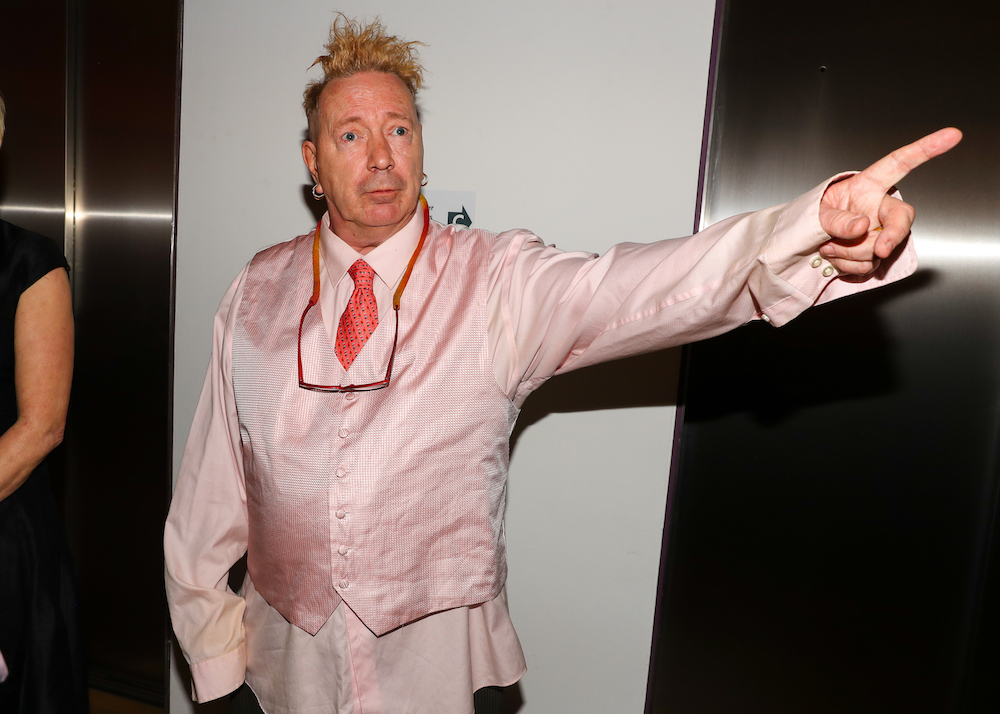
“Yeah, you’ve got me. What now?!”
That’s how punk legend John Lydon—aka Johnny Rotten—the former frontman for the Sex Pistols (and longtime leader of post-punk band Public Image Ltd.) kicked off his interview with artnet News on the occasion of a landmark show at the Museum of Arts and Design in New York that explores the punk and post-punk scene through the lens of graphic design.
Lydon, despite his snarl, is thrilled about the exhibition, titled “Too Fast to Live, Too Young to Die: Punk Graphics,” and participated in a lively talk with author and music historian Gillian McCain on opening day. (How was the talk’s attendance? “Packed! Like a New York City subway car,” he said, adding: “I love the name MAD for a museum!”)
The exhibition features more than 400 items including flyers, posters, album covers, promotional materials, zines, and other ephemera from the decade between 1976 to 1986. “It’s intriguing and important,” Lydon said—and besides, “people need to be reminded of just how far ahead the rest of them the Sex Pistols were.”
Posters promoting Sex Pistols albums in the show “Too Fast to Live, Too Young to Die: Punk Graphics,” at the Museum of Arts and Design (MAD). Photo by Neil Rasmus/BFA.com
Despite the fact “some of the artwork is erroneously credited to the people who worked for us,” Lydon said, “it’s honest and original. The Sex Pistols had a lot to do with the work. The songs came first, but how to package the artwork is also very important.”
The social and political backdrop of the UK in the 1970s and ’80s had a huge influence on the punk graphics of the day, Lydon said. Blackmail lettering—like that on the cover of the Sex Pistols’ only studio album, Never Mind the Bollocks, Here’s the Sex Pistols—was a charged premonition of the Winter of Discontent of 1978–79, during which public sector unions went on strike, leaving heaps of trash all around the country.
“We incorporated these things and people clearly understood that it related to what was going on in the UK at the time,” Lydon said.
As for band’s famous cover for their single, “God Save the Queen,” one of the most recognizable images in the history of music? “When we used the Queen’s image, we never considered copyright,” he said. “As taxpayers, the presumption was that she was ours. There was massive unemployment and riots and big demonstrations. It made for a glorious background. You couldn’t plan it any better. That’s why it worked so well.”
Installation view featuring Sex Pistols paraphernalia and “God Save the Queen” cover artwork. Image courtesy the Museum of Arts and Design.
Lydon said he took issue with several people in the packed MAD audience during his talk who “said I copied everything from the Ramones,” another legendary band who feature prominently in the exhibition (and were the focus of a blockbuster exhibition at the Queens Museum in 2016).
“Fair play to them,” Lydon said, but not true “in any way, shape, or form. ‘God Save the Queen’ was not about a drag queen in lower Manhattan.”
Other observations about the show? “There was not enough Dead Kennedys. They were exactly what America needed at that time.”
But in between bouts of nostalgia (which Lydon quipped is “better than neuralgia”), his signature feistiness peeked out.
“I noticed a decline in the art of the Sex Pistols after I left,” he said.
Lydon formed Public Image Ltd. in the late 1970s and said artwork has remained an important part of the “packaging,” despite conceding that it was a detestable word. (The band still performs and is scheduled to play a music festival in Huntington Beach in about two weeks).
Opening day of “Too Fast to Live, Too Young to Die: Punk Graphics,” at the Museum of Arts and Design (MAD). Photo by Neil Rasmus/BFA.com
We also took the opportunity to ask Lydon about the oft-raised suggestion that he is a supporter of President Donald Trump, whose remarks, Lydon told artnet News, were “wildly entertaining.”
“Ever since I can remember, the truth about politicians is that they’re liars, cheats, and frauds,” he said. “So what looks like a corrupt businessman playing with them is hilarious to me. What every country needs is a serious shakeup. I don’t see it all going pear shaped.”
He added: “People say I’m a Trump supporter for daring to even say this. I’m sorry, but I don’t have an extremist world view. Mother Lydon didn’t raise foolish children.”
Lydon, who is now a US citizen and has lived in California for the past 35 years, doesn’t share some of the President’s main concerns. The singer would rather focus on the problem of homelessness in California over issues regarding illegal immigration, he says.
Lydon stressed that he’s always open-minded, and particularly values friends who have radically different opinions than he does. Discourse is “healthy,” and “chatter” is one of the few things in life that are free, he said.
In signing off, he had this parting piece of advice for us: “May the road rise to meet you, and your enemies always be behind you. May they scatter, shatter, and splatter. Peace!”
“Too Fast to Live, Too Young to Die” is on view at the Museum of Arts and Design through August 18.